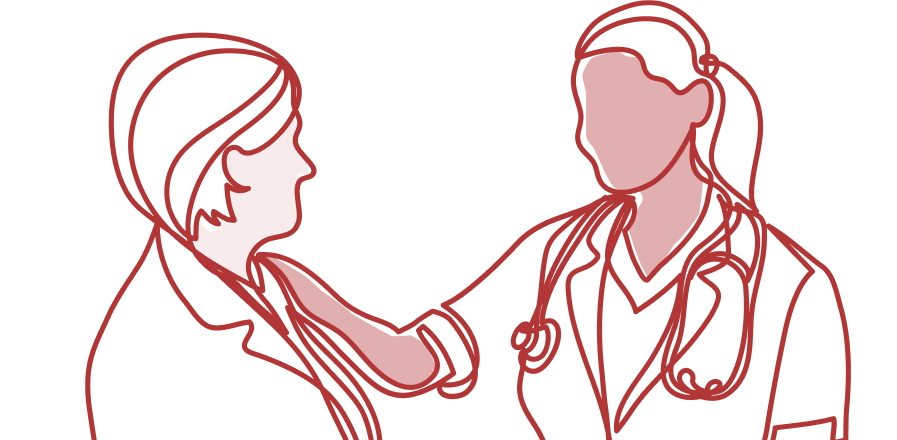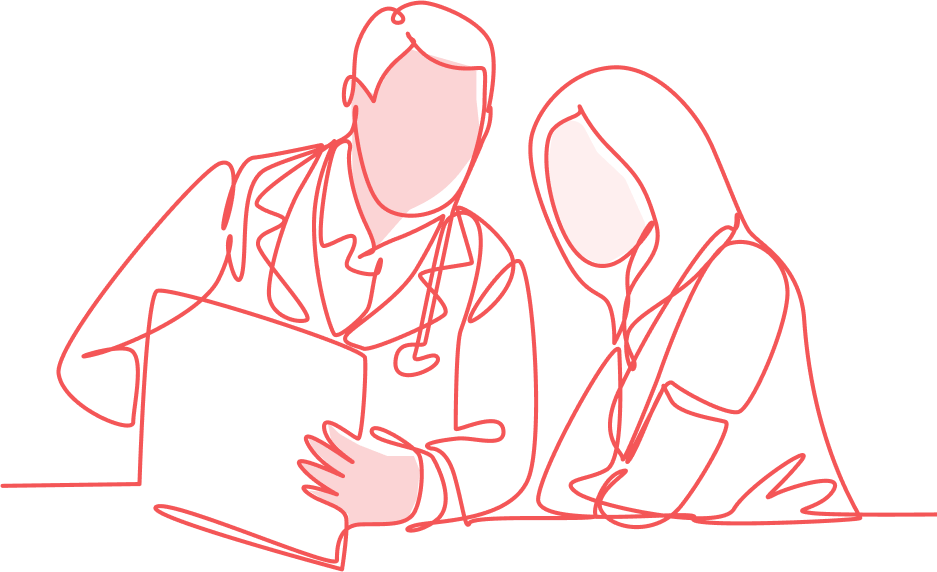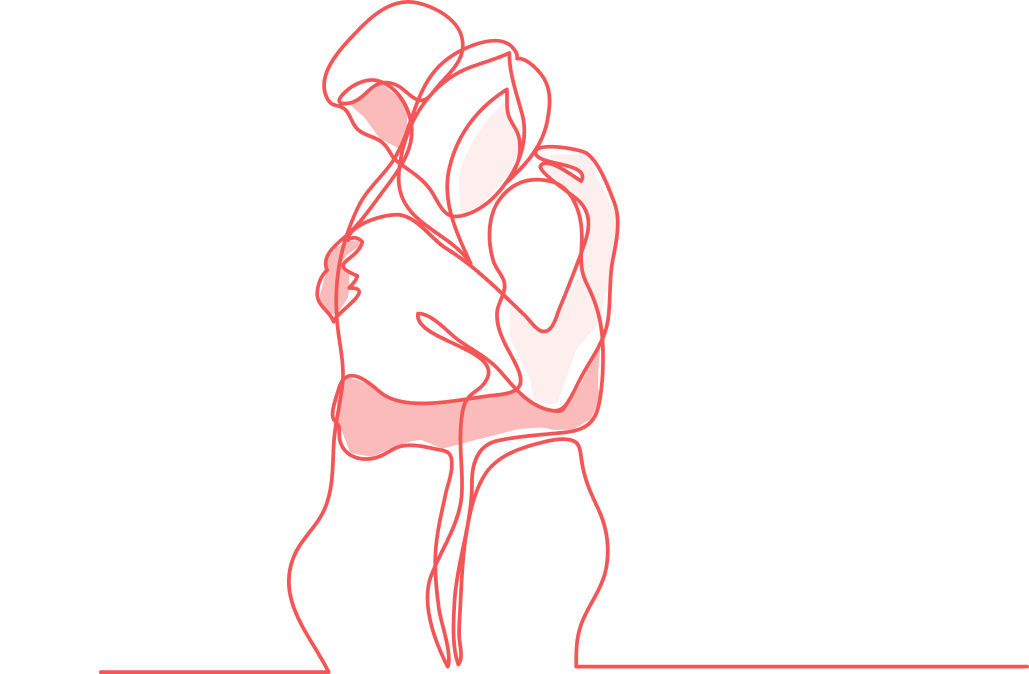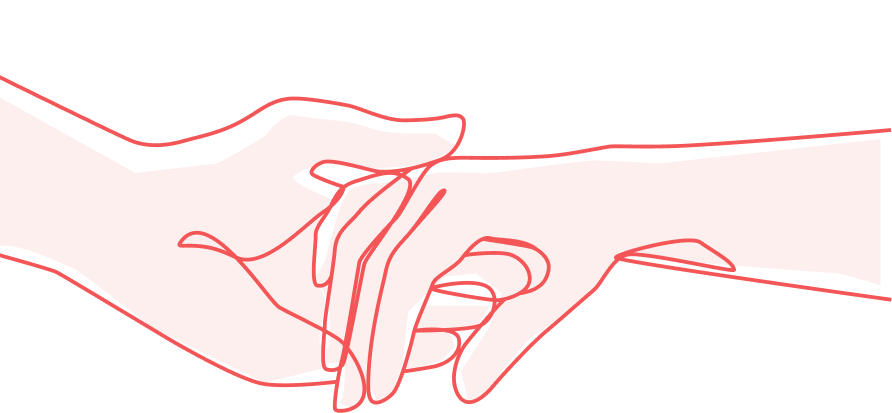Information on
primary TNBC
Click to read more >
Useful things to know
- Being diagnosed with breast cancer can be a lot to process and can feel incredibly isolating. Know that there are people around you to support you and that you can talk to:
UK:
Macmillan – Waiting for results
Breast Cancer Now - Waiting for breast biopsy results can be a scary time
Ireland:
Irish Cancer Society - Waiting on results
Treatment options for primary TNBC
The treatment for TNBC is usually a combination of:
- Surgery to remove some or all of your breast and lymph nodes (in your armpit)x
- Chemotherapy which aims to destroy cancer cells using anti-cancer drugs.xi It is often used prior to surgery in people with TNBC to reduce the size of the tumour.
- Radiotherapy which destroys cancer cells using high-energy x-rays.xi It is often used after surgery and chemotherapy in people with TNBC.
- Immunotherapy which is a type of treatment that helps the body’s own immune system to seek out and kill cancer cells.xii
More information on these treatments can be found here:
UK:
(note these pages are not TNBC specific)
Macmillan Cancer Support – Types of treatment
Breast Cancer Now – Going through breast cancer treatment
Ireland:
Irish Cancer Society - How is triple negative breast cancer treated
What about hormone therapy?
You may have heard of hormone therapy that is used to treat many breast cancers. However, hormone therapy works by targeting hormone receptors in the breast cancer cells. Because these receptors are not present in triple-negative breast cancer, these treatments are not effective and so chemotherapy is often the main treatment option.
What about clinical trials?
Clinical trials are research studies involving people. They can investigate a lot of different things, including how well a new treatment option works, whether it is safe or is an improvement on currently available treatments.
There are very strict regulations around conducting clinical trials and any new treatment will have gone through a rigorous testing in laboratories before it is given to any humans. There are also lots of different types of trials so understanding exactly what would be involved and taking sufficient time to consider is important, before you give consent to take part. Note that by giving your consent, you are agreeing to take part, however, you can withdraw from the trial at any time without giving a reason.
Finding out about clinical trials
Your oncologist or specialist breast care nurse may discuss clinical trials with you, or you can ask them if there are any in your area that might be suitable for you. Clinical trials have very strict guidelines about who can be involved and so be prepared that you might not be able to take part in a trial. In addition, if you feel that taking part in a trial is not the right option for you, you can decline without giving a reason. This will not affect the care you will receive.
More information on clinical trials including a database of breast cancer clinical trials in the UK can be found here: Cancer Research UK – Research and clinical trials
Information on clinical trials in Ireland can be found here: Irish Cancer Society - Clinical trials
What happens after treatment?
- After your treatment, you will have regular follow-up appointments and usually a mammogram every year. It is natural to worry during this period and these appointments offer an opportunity to discuss any concerns you have. You can also contact your cancer doctor or nurse at any time if you have concerns or notice new symptoms.
Will the cancer come back?
- Even after successful treatment, it is possible for your cancer to return.
- Although research suggests the risk of TNBC coming back or spreading is higher in the first few years than in some other types of breast cancer, after around five years the risks are similar to, and may be lower than, other types of breast cancer.i
- You can read more about the possible symptoms of breast cancer recurrence here: Breast Cancer Now – Breast cancer recurrence symptoms
Information on
secondary TNBC
Click to read more >
Useful things to know
- Being diagnosed with breast cancer can be a lot to process and feel incredibly isolating. Know that there are people around you to support you and that you can talk to:
- Secondary (or metastatic or advanced) breast cancer refers to breast cancer that has spread to other parts of the body. When you have secondary breast cancer, your doctor may still refer to the cancer in the breast as ‘the primary cancer’.
- Some people may be diagnosed with secondary breast cancer having already been diagnosed and treated for breast cancer, or if their cancer has already spread when they are diagnosed.
- In secondary breast cancer, the main aim of treatment is to control and slow down the spread of your cancer any further. When the cancer is at bay and there are no visible tumours present, this is known as remission. Even when in remission, there will always remain a risk that the cancer will return.
UK:
Macmillan – Waiting for results
Breast Cancer Now - Waiting for breast biopsy results can be a scary time
Ireland:
Irish Cancer Society - Waiting on results
I didn’t have triple-negative breast cancer before?
- In some cases, the nature of the breast cancer may have changed between a primary and secondary diagnosis. For example, where a primary tumour may have been hormone receptor positive, the secondary breast cancer may have transformed into triple-negative breast cancer.
Treatment options for secondary TNBC
The treatment for secondary TNBC is usually a combination of:- Chemotherapy which aims to destroy cancer cells using anti-cancer drugs.xi It can often be used prior to surgery to reduce the size of the tumour.
- Radiotherapy which destroys cancer cells using high-energy x-rays.xi It is sometimes used during treatment for secondary breast cancer.
- Immunotherapy which is a type of treatment that helps the body’s own immune system to seek out and kill cancer cells.xii
More information on these treatments can be found here:
UK:
(note these pages are not TNBC specific)
Macmillan Cancer Support – Types of treatment
Breast Cancer Now – Going through breast cancer treatment
Ireland:
Irish Cancer Society - How is triple negative breast cancer treated
What about hormone therapy?
You may have heard of hormone therapy that is used to treat many breast cancers. However, hormone therapy works by targeting hormone receptors in the breast cancer cells. Because these receptors are not present in triple-negative breast cancer, these treatments are not effective and so chemotherapy is often the main treatment option.
What about clinical trials?
Clinical trials are research studies involving people. They can investigate a lot of different things, including how well a new treatment option works, whether it is safe or is an improvement to currently available treatments.
There are very strict regulations around conducting clinical trials and any new treatment will have gone through a rigorous testing in laboratories before it is given to any humans. There are also lots of different types of trials and so understanding exactly what would be involved and taking sufficient time to consider is important before you give consent to take part. Note that by giving your consent, you are agreeing to take part, however, you can withdraw from the trial at any time without giving a reason.
Finding out about clinical trials
Your doctor or specialist nurse may discuss clinical trials with you, or you can ask them if there are any in your area that might be suitable for you. Clinical trials have very strict guidelines about who can be involved and so be prepared that you might not be able to take part in a trial. In addition, if you feel that taking part in a trial is not the right option for you, you can decline without giving a reason. This will not affect the care you will receive.
More information on clinical trials including a database of breast cancer clinical trials in the UK can be found here: Cancer Research UK – Research and clinical trials
Information on clinical trials in Ireland can be found here: Irish Cancer Society - Clinical trials
Supportive care
- Supportive care (also known as palliative care) is available to anyone to help relieve and prevent certain symptoms, such as pain and fatigue, or to provide psychological support in living with secondary breast cancer. It is often provided alongside your regular medical treatment.
- Supportive or palliative care is not necessarily end-of-life treatment and can be useful at any time when living with secondary breast cancer.








